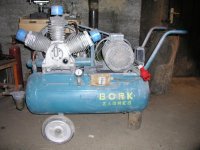Soundguy
Old Timer
- Joined
- Mar 11, 2002
- Messages
- 52,424
- Location
- Central florida
- Tractor
- RK 55HC,ym1700, NH7610S, Ford 8N, 2N, NAA, 660, 850 x2, 541, 950, 941D, 951, 2000, 3000, 4000, 4600, 5000, 740, IH 'C' 'H', CUB, John Deere 'B', allis 'G', case VAC
</font><font color="blue" class="small">( Mine is a true 5 HP electric motor..... not one that is about 2 HP, but some engineer has some fancy way of figuring out how to call it a 5 HP by doing some fancy footwork )</font>
Not fancy footwork.. just depends on how it was rated... could be listed as peak HP?
This is a common situation in many industries. Take audio amplifiers. You generally want to see the watt rating in rms ( root mean square (for the non-electronic types ).. but you still see peak watt ratings used in many applications.. and those just are not realized outputs Sine wave measurement really muddies the watter with differences between average, rms, peak, and peak to peak readings.. not to mention specialized test equipmet.. like peak reading vom's .
Same holds true with most small engine manufacturers. I can run down to tsc and buy a 3500$ lawnmower that advertises the same engine HP as my ford 8n is rated for. No offense.. but a huskie lawnmower doesn't crank out the 'same' 26 HP and my 8n does. Torque has alot to do with it and rpm rating. Reading the specs for what is done when testing engine hp claims is like watching sausage being made. In many cases, the max hp rating of an engine is taken bare bones, and at an rpm that is pretty much just about to make the engine self detonate.. situations you'll never see when mowing the grass...
I chalk it up to too much advertising influence over the engineering process.
Soundguy
Not fancy footwork.. just depends on how it was rated... could be listed as peak HP?
This is a common situation in many industries. Take audio amplifiers. You generally want to see the watt rating in rms ( root mean square (for the non-electronic types ).. but you still see peak watt ratings used in many applications.. and those just are not realized outputs Sine wave measurement really muddies the watter with differences between average, rms, peak, and peak to peak readings.. not to mention specialized test equipmet.. like peak reading vom's .
Same holds true with most small engine manufacturers. I can run down to tsc and buy a 3500$ lawnmower that advertises the same engine HP as my ford 8n is rated for. No offense.. but a huskie lawnmower doesn't crank out the 'same' 26 HP and my 8n does. Torque has alot to do with it and rpm rating. Reading the specs for what is done when testing engine hp claims is like watching sausage being made. In many cases, the max hp rating of an engine is taken bare bones, and at an rpm that is pretty much just about to make the engine self detonate.. situations you'll never see when mowing the grass...
I chalk it up to too much advertising influence over the engineering process.
Soundguy
